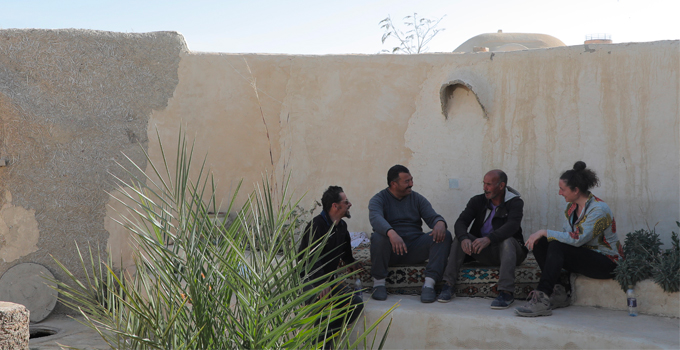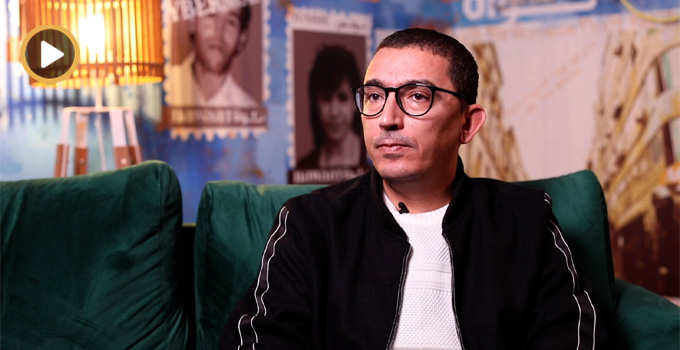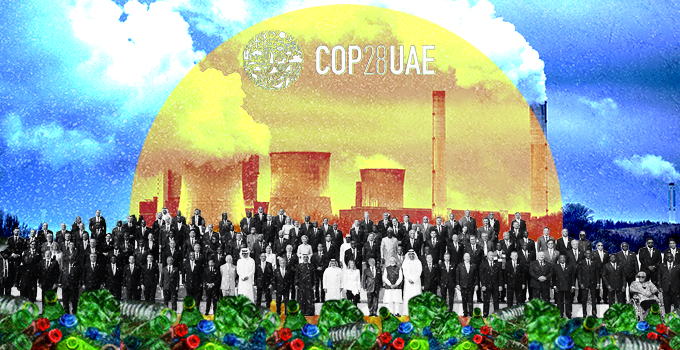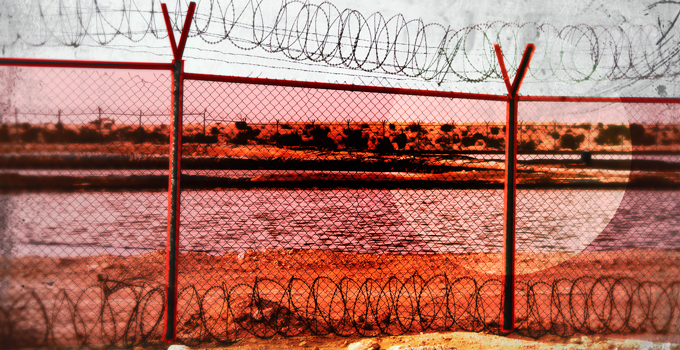A convoluted itinerary of twists and turns finally lands us at the farm of Basset and Corinne, 13 kilometers from Hajeb El Ayoun in the southwest of Kairouan. Arriving here, the land appears to stretch on almost invariably in all directions : dry earth, dense and barren, and a desert-like silence. The few homes we spot along the way seem almost to disappear within the vastness of the plains. It is still the beginning of spring, but a hot wind already sweeps across the arid ground, a foreboding hint of the dry season looming ahead. This is, however, precisely where the Abassi family chose to create a training center dedicated to permaculture. The latter, which encompasses principles and practices coined and developed by Bill Mollison and David Holmgren in 1974, promotes the conception of living spaces that are self-sufficient and environmentally sustainable.

When we arrive, the Abassis are awaiting a dozen farmers who will participate in an introduction to soil regeneration with the idea that the latter will practice what they learn on their own land. Only two participants show. « It’s not easy to get them to come, I think we’ll have to go knock on doors. Besides, this would help us to better understand the difficulties they encounter », says Basset. The objective is to train 15 to 30 crop and livestock farmers throughout the region in order to develop awareness on a community-level. « At some point people have to realize that we cannot solve environmental problems alone. We must take collective action and change our agricultural practices », he explains.
Experimental farm
In November 2013, the couple purchased 8 hectares of neglected farm land: 250 degraded olive trees, overworked soil, an unequipped well and no electricity.
« We started by planting trees to create a hedge using acacias and hindi, then we worked the soil thanks to our Keyline plow which maximizes use of water resources and favors natural soil regeneration processes », Corinne explains. In order to resolve the water issue, she adds, « we set up a conventional irrigation system using the state-owned well, but limited our dependence on it as much as possible ».

Thanks to volunteer work groups starting in 2016, a number of spaces were created using the Superadobe construction technique: filling bags with earth and stacking them atop one another. The farm was thus equipped with a center which held a large space to welcome participants for courses, bathrooms with dry toilets, two little domes to house workshops, as well as a large terrace and dome (still under construction) that will eventually serve as an outdoor kitchen. « We would have liked things to go a little faster, but that is also permaculture, allowing a space to exist owing to the collaboration of individuals who come to offer a hand » remarks Corinne, who also confides that the couple did not have the financial means to hire paid labor.

A group of young volunteers cross the terrace where we are sitting. They have come from all over the country. « We often host volunteers. We provide them with room and board, and in exchange they help us with work on the farm », Corinne tells us. This is also what infuses the project with a collective dynamic, both on a local and global level. « The idea is not to create a bubble but to be open to others: to neighboring farmers, to agronomy students, to foreigners passing through… to anyone who might contribute to developing permaculture », she tells us. Trainings usually take place on the farm, however, Corinne has also moved around to accompany some twenty permaculture projects in other locations. « These are different experiments with extremely varied results. Some projects have failed while others are still being developed. What is true for all of them, however, is that even permaculture experiments require an entrepreneurial mindset », she points out.
Bringing permaculture to the state level
At the institutional level, initiatives that promote an alternative agricultural approach have just started to blossom. It is through a program developed with the Conservation and Protection of Agricultural Lands Directorate (DGACAT) that L’Ombre du Palmier (the official name of Basset and Corinne’s project) trains farmers throughout the region. They have also trained a dozen instructors at the Agricultural Awareness and Training Agency, as well as personnel at the Regional Commissariat of Agricultural Development (CRDA) in Siliana and Kef through an initiative by the International Center for Agricultural Research in the Dry Areas (ICARDA). L’Ombre du Palmier has also started a training program for one hundred individuals including professors and students from the Institute of Agronomic Sciences of Chott Meriem.
These new initiatives reveal a growing interest in permaculture. « This was still unimaginable a few years ago. So yes, it’s a victory », says Corinne. Agricultural sectors have yet to offer courses that teach an alternative approach. Teachers, however, have demonstrated their own will to rethink agricultural techniques in the face of global warming. It is not so much political will as it is personal initiatives within institutions or the integration of programs financed by foreign funders that are driving this shift at the institutional level. This is true for the PROSOL project headed by the DGACAT and co-financed by the GIZ. Increasing periods of drought and the growing pressure on natural resources—soil and water in particular—are also pushing opening the field of reflection. « It’s no longer an option to pretend as if conventional agriculture were not an ecological disaster », Basset insists.

Often perceived as an amateur practice, permaculture is a scientific approach. Nevertheless, some misconceptions are hard to change. Have the workshops themselves started to bear any fruits? « It is difficult to measure the impact, it’s still too early. During the course of trainings, however, we have seen very skeptical individuals shift their perspectives » Corinne recalls. The Polytechnic School of Sousse has also solicited L’Ombre du Palmier to train students about the ecological technique of Superadobe, not merely in terms of its structural significance but also its human and social dimensions. For the Abassis, this too is an important step, since it demonstrates that alternative experiments can reach much broader groups. At Chott Meriem, an experimental plot devoted to permaculture has been started in order to put into practice agricultural techniques that are environmentally sustainable. « Permaculture is a response to current crises », Corinne notes, adding that « all these initiatives by groups once skeptical of such alternative practices are proof that things are changing, that mindsets are shifting ».
Taking stock
When Corinne and Basset first started out in Hajeb El Ayoun, they imagined their project would appeal mostly to recent rural transplants in search of a more resilient way of life, and one that is closer to nature. « It took a long time for us to understand that our audience would be much more diverse », Corinne muses. Diverse, yes, though not necessarily abundant. « Over a period of ten years, we’ve probably had about a hundred participants… that’s not a lot! » she remarks. « This has brought us to question our model, our stubbornness to remain financially autonomous… Today, we are restructuring our model in order to better position ourselves and improve our communication », explains Corinne. « We are very poor entrepreneurs », she adds with a tone of irony.

For Basset, the priority now is to develop the space to serve as a testament to success. « Our farm doesn’t yet prove all that permaculture can achieve in terms of profitability and productivity. And yet that is obviously the first thing that a farmer is going to look for », he explains. « Even if they can see that our olive trees suffer less than theirs, we have to prove that it is possible to return to traditional techniques which utilize neither pesticides nor a bunch of tubing… » A challenge that the Abassis hope to meet in spite of all the obstacles—especially in the form of legislation and mindsets—which hinder the development of alternative projects. Neighboring farmers, once dubious with regards to their approach to farming, now stop by on a regular basis to take a look and ask questions. « Just yesterday, I was shredding acacia branches to make mulch. One of my neighbors wanted to understand what I was doing and how to do it », recounts Basset.
Each encounter is an opportunity for exchange, to share experiences and propose concrete solutions. Crop association, nettle fertilizer against parasites, native seed conservation, composting…just a few techniques practiced by the farmer whose hands are marked by his or her love for the earth. Confronted with a productivist model of agriculture on the decline, permaculture and agroecology propose another path, and are taking root in the most unlikely and unexpected of places. In Hajeb El Ayoun, Basset and Corinne continue to hang on, and hope to see autonomous farms sprout up here and there, all across the country.





 This search is powered By Nawaat experimental generative artificial intelligence. Begin typing your search or question above then press return. Press Esc to cancel.
This search is powered By Nawaat experimental generative artificial intelligence. Begin typing your search or question above then press return. Press Esc to cancel.
iThere are no comments
Add yours